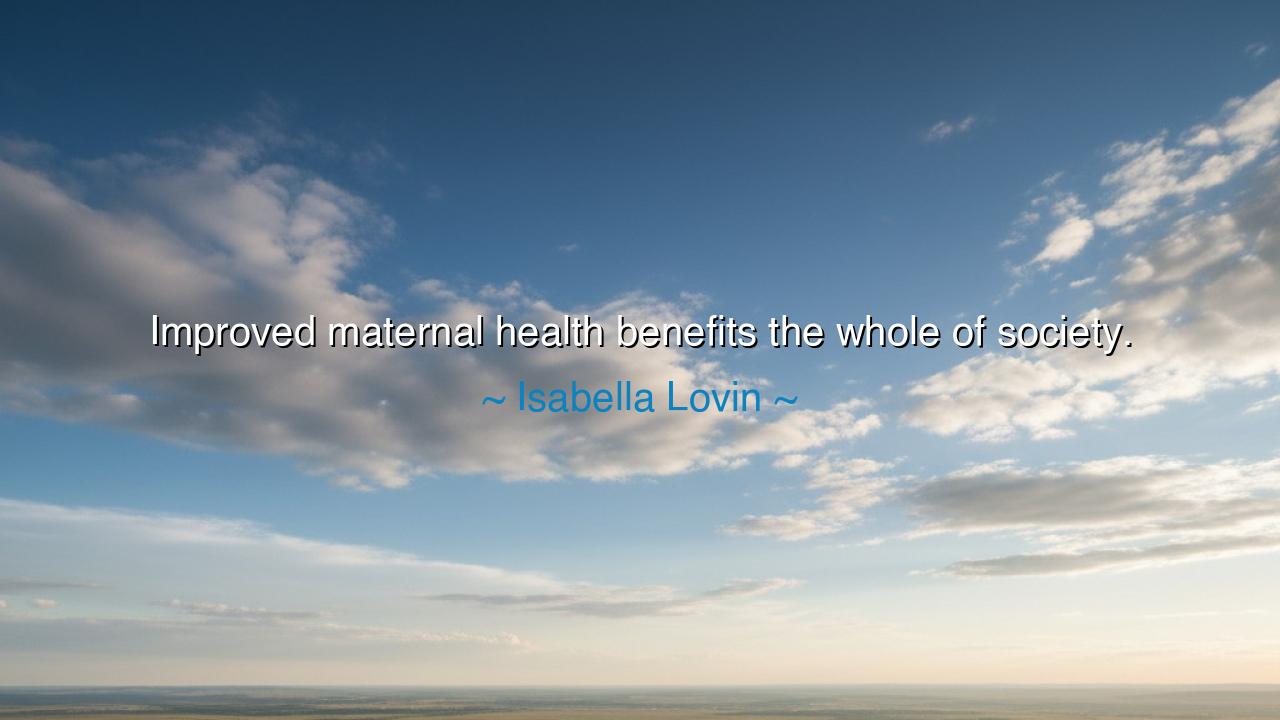
Improved maternal health benefits the whole of society.






In the gentle yet powerful words of Isabella Lövin, Swedish politician and advocate for global equality, we find a truth that transcends politics, economics, and time itself: “Improved maternal health benefits the whole of society.” These few words carry within them the wisdom of civilization — the understanding that the well-being of mothers is not a private matter, but the foundation upon which all human progress rests. Lövin, who has devoted much of her life to environmental and social justice, speaks here as one who sees clearly the web that connects all living things. For when a mother thrives, a child thrives; and when children grow strong and healthy, the future itself is nourished. Thus, in her statement, she calls us to remember the most ancient truth of all: that to care for life at its beginning is to secure the destiny of all who follow.
The origin of this quote lies in Lövin’s lifelong commitment to sustainable development, gender equality, and humanitarian reform. As a leader and former minister for international development cooperation, she has witnessed how the neglect of maternal health ripples outward — weakening families, economies, and communities. Her words come not from abstraction, but from the evidence of countless lives: in nations where women receive proper care before, during, and after childbirth, infant mortality drops, education rises, and poverty recedes. In those where women are left to struggle alone, the opposite holds true. Her insight is both moral and practical, both compassionate and strategic: to uplift mothers is to uplift nations.
This wisdom is not new. From the earliest civilizations, the health of mothers has been seen as sacred. In ancient Egypt, the goddess Isis was revered as the mother of all creation — a symbol of nurturing and restoration. The Greeks honored Demeter, whose love for her child sustained the world through the turning of the seasons. In these ancient myths, the message was clear: the mother is the vessel of continuity, the bridge between what was and what shall be. When she suffers, all creation trembles; when she flourishes, life abounds. Isabella Lövin, speaking in the language of modern governance, rekindles this ancient reverence — reminding us that the divine act of giving life must be met with the highest care and respect.
History too offers its lessons. In the early 20th century, the world saw how simple acts of compassion could transform entire societies. When midwives and public health programs were established in countries like Sweden and Norway, maternal deaths fell dramatically. Women who once faced childbirth with fear began to face it with hope. This wave of reform did not merely save mothers; it built stronger families, healthier children, and more resilient communities. Education flourished, economies grew, and the nations themselves rose from hardship into stability. These are not coincidences — they are the fruit of valuing the source of life itself. Each mother who survives, each child who is safely born, is a seed of peace planted in the soil of the world.
Lövin’s quote also speaks to the moral dimension of society. To neglect the health of mothers is to deny the sacred bond of humanity — to forget that every leader, every worker, every creator was once carried within the body of a woman who gave of her strength, her blood, her very life to bring another into being. When a society treats this sacrifice as ordinary or expendable, it reveals its blindness. But when it honors it — through access to healthcare, education, nutrition, and protection — it affirms the dignity of life itself. Thus, improving maternal health is not charity; it is justice. It is the acknowledgment that no civilization can call itself advanced while its mothers suffer in silence.
There is also a deeper wisdom in Lövin’s insight — that the act of nurturing is not confined to women or to childbirth alone. It is a principle, a way of being, that the whole of society must learn. Just as the body depends on the heart to sustain it, so does humanity depend on compassion to endure. The care given to mothers teaches all people the art of care itself — how to serve the weak, how to give without demand, how to protect what is precious. To cultivate maternal health is to cultivate the ethic of care, that sacred balance which keeps the machinery of progress from becoming soulless.
The lesson, then, is both simple and profound: if you wish to build a strong and enduring society, begin by honoring those who give it life. Support maternal health not as an afterthought, but as a cornerstone. Advocate for prenatal care, for safe childbirth, for education and equality. Build systems that ease the burden of motherhood, rather than multiplying it. And in your own life, nurture those around you — for every act of compassion, however small, strengthens the invisible web that binds us together.
So, children of the world, heed the wisdom of Isabella Lövin. To care for mothers is to care for the world; to safeguard birth is to safeguard the future. A nation that cherishes its mothers is a nation that will never run dry of hope. Let your hands, your voices, your hearts work toward that end — until every mother can bring forth life in safety and dignity, and the world itself is reborn through the power of her well-being.






AAdministratorAdministrator
Welcome, honored guests. Please leave a comment, we will respond soon